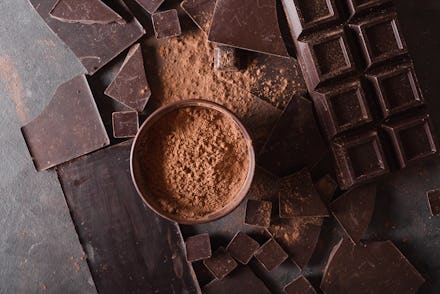Does chocolate actually improve your brain power?

Can a piece of chocolate a day keep memory problems at bay? According to a new review paper from Italian researchers, the antioxidants in chocolate show promise for boosting memory and cognition. Published in Frontiers in Nutrition in May, the paper found eating chocolate can be good for cognitive performance.
But before you go out and binge on Hershey’s in an effort to remember where you put your keys, here’s a breakdown of the actual science behind chocolate and cognition.
The effect of cocoa on your brain
The naturally occurring antioxidants in chocolate, called cocoa flavanols, were investigated for their effect on cognition. Despite mixed results from several prior studies on flavanols and their effect on brain performance, authors of the Frontiers in Nutrition review paper concluded that when consumed in larger amounts, cocoa flavanols could benefit brain health and memory.
Unsurprisingly, the dosage and amount of testing play a large role. The studies mentioned within the review found the effects of chocolate were sometimes more pronounced when participants completed difficult and rigorous memory testing.
The positive effect of cocoa flavanols was especially promising for older adults. Studies have found that cocoa drinks with high concentrations of flavanols helped adults with memory problems and also improved performance on verbal fluency tasks. Adults consuming 520 to 993 milligrams of flavanols experienced the most benefits. (A gram of cocoa powder has 34.6 milligrams of flavanols, so subjects in that particular study consumed much more than a glass of chocolate milk or a chocolate bar.)
Still, the review paper has limitations. This paper was not a meta-analysis, so there was no statistical examination of study data — researchers reviewed 49 existing studies on chocolate and qualitatively evaluated the methodologies and conclusions. While the authors stated no conflict of interest, it’s possible that any of the studies included could have been partly funded by the chocolate industry. For example, a 2014 study on chocolate and memory — which was not included in this review — was partially funded by the chocolate company Mars.
The takeaway
Several studies reviewed in the paper indicated that the flavanols in chocolate could give our aging brains a boost, but the chocolate dosage required to see such health benefits remains unclear. For one study, participants drank a high-flavanol beverage with flavanols equivalent to seven chocolate bars. Eating tons of chocolate, however, certainly isn’t the healthiest strategy for staving off dementia.
Focusing on your holistic diet instead of dessert is still the best way to go. A 4,000-person study from April 2017 found that drinking lots of sugary drinks made the brain shrink and led to lower scores on memory tests. Meanwhile, a 2017 study revealed that the Mediterranean diet — which focuses on fish, whole grains, vegetables and olive oil — could protect the brain from shrinking.
Despite what other headlines might say, the conclusion remains decidedly less sensationalist: Less sugar and more vegetables are what does a body — and brain — good.